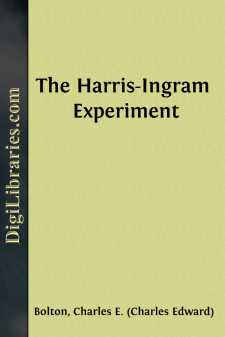Categories
- Antiques & Collectibles 13
- Architecture 36
- Art 48
- Bibles 22
- Biography & Autobiography 813
- Body, Mind & Spirit 142
- Business & Economics 28
- Children's Books 16
- Children's Fiction 13
- Computers 4
- Cooking 94
- Crafts & Hobbies 4
- Drama 346
- Education 46
- Family & Relationships 57
- Fiction 11829
- Games 19
- Gardening 17
- Health & Fitness 34
- History 1377
- House & Home 1
- Humor 147
- Juvenile Fiction 1873
- Juvenile Nonfiction 202
- Language Arts & Disciplines 88
- Law 16
- Literary Collections 686
- Literary Criticism 179
- Mathematics 13
- Medical 41
- Music 40
- Nature 179
- Non-Classifiable 1768
- Performing Arts 7
- Periodicals 1453
- Philosophy 64
- Photography 2
- Poetry 896
- Political Science 203
- Psychology 42
- Reference 154
- Religion 513
- Science 126
- Self-Help 84
- Social Science 81
- Sports & Recreation 34
- Study Aids 3
- Technology & Engineering 59
- Transportation 23
- Travel 463
- True Crime 29
The Harris-Ingram Experiment
Categories:
Description:
Excerpt
THE HARRISES IN NEW YORK
It was five o'clock in the afternoon, when a bright little messenger boy in blue touched the electric button of Room No. —— in Carnegie Studio, New York City. At once the door flew open and a handsome young artist received a Western Union telegram, and quickly signed his name, "Alfonso H. Harris" in the boy's book.
"Here, my boy, is twenty-five cents," he said, and tore open the message, which read as follows:—
Harrisville,—.
Alfonso H. Harris,
Carnegie Studio, New York.
We reach Grand Central Depot at 7:10 o'clock tomorrow evening in our new private car Alfonso. Family greetings; all well.
Reuben Harris.
Alfonso put the telegram in his pocket, completed packing his steamer trunk, wrote a letter to his landlord, enclosing a check for the last quarter's rent, and ran downstairs and over to the storage company, to leave an order to call for two big trunks of artist's belongings, not needed in Europe.
A hansom-cab took him to the Windsor Hotel, where he almost forgot to pay his barber for a shave, such was his excitement. A little dry toast, two soft boiled eggs, and a cup of coffee were quite sufficient, since his appetite, usually very good, somehow had failed him.
It was now fifteen minutes to seven o'clock. In less than half an hour Alfonso was to meet his father, mother, and sisters, and after a few days in the metropolis, join them in an extended journey over the British Isles, and possibly through portions of Europe.
Alfonso was the only son of Reuben Harris, a rich manufacturer of iron and steel. His father, a man naturally of very firm will, had earnestly longed that his only son might succeed him in business, and so increase and perpetuate a fortune already colossal. It was a terrible struggle for Harris senior to yield to his son's strong inclination to study art, but once the father had been won over, no doubt in part by the mother's strong love for her only boy, he assured Alfonso that he would be loyal to him, so long as his son was loyal to his profession. This had given the boy courage, and he had improved every opportunity while in New York to acquaint himself with art, and his application to study had been such that he was not only popular with his fellow artists, but they recognized that he possessed great capacity for painstaking work.
Alfonso jumped into a coupé, having ordered a carriage to follow him to the Grand Central Station. It was ten minutes yet before the express was due. Nervously he puffed at his unlighted cigar, wishing he had a match; in fact, his nerves were never more unstrung. It was a happy surprise, and no doubt his youthful vanity was elated, that his father should have named his new palace car "Alfonso." At least it convinced him that his father was loyal.
As the coupé stopped, he rushed into the station, just in time to see the famous engine No. 999 pull in. She was on time to a second, as indicated by the great depot clock. A ponderous thing of life; the steam and air valves closed, yet her heavy breathing told of tremendous reserve power....


